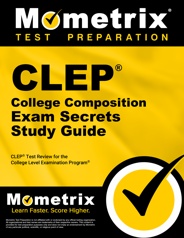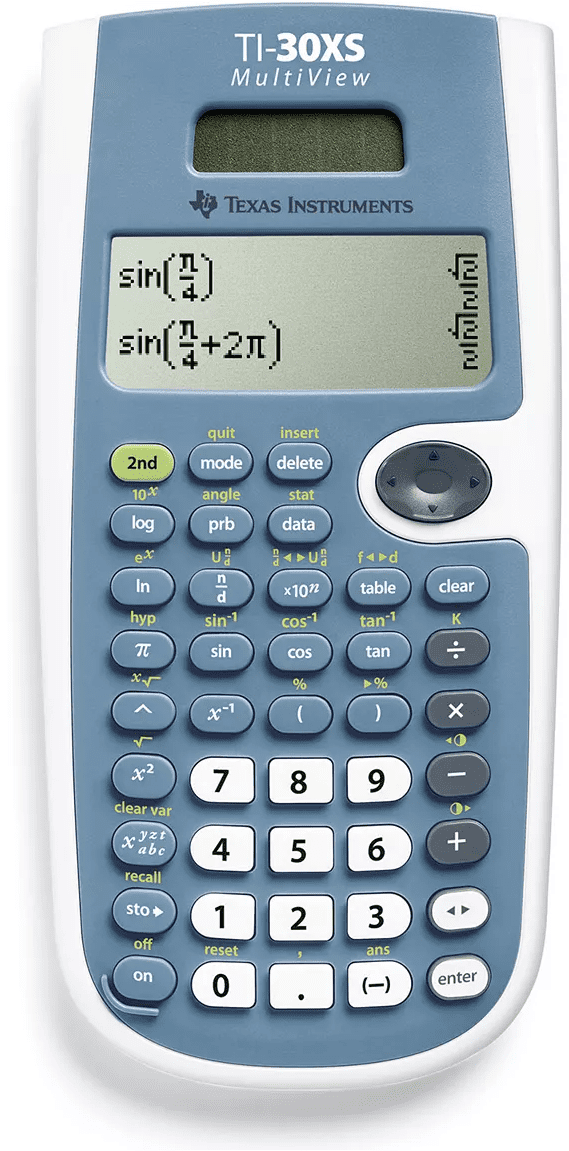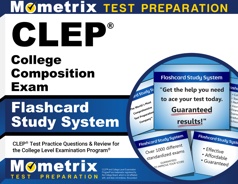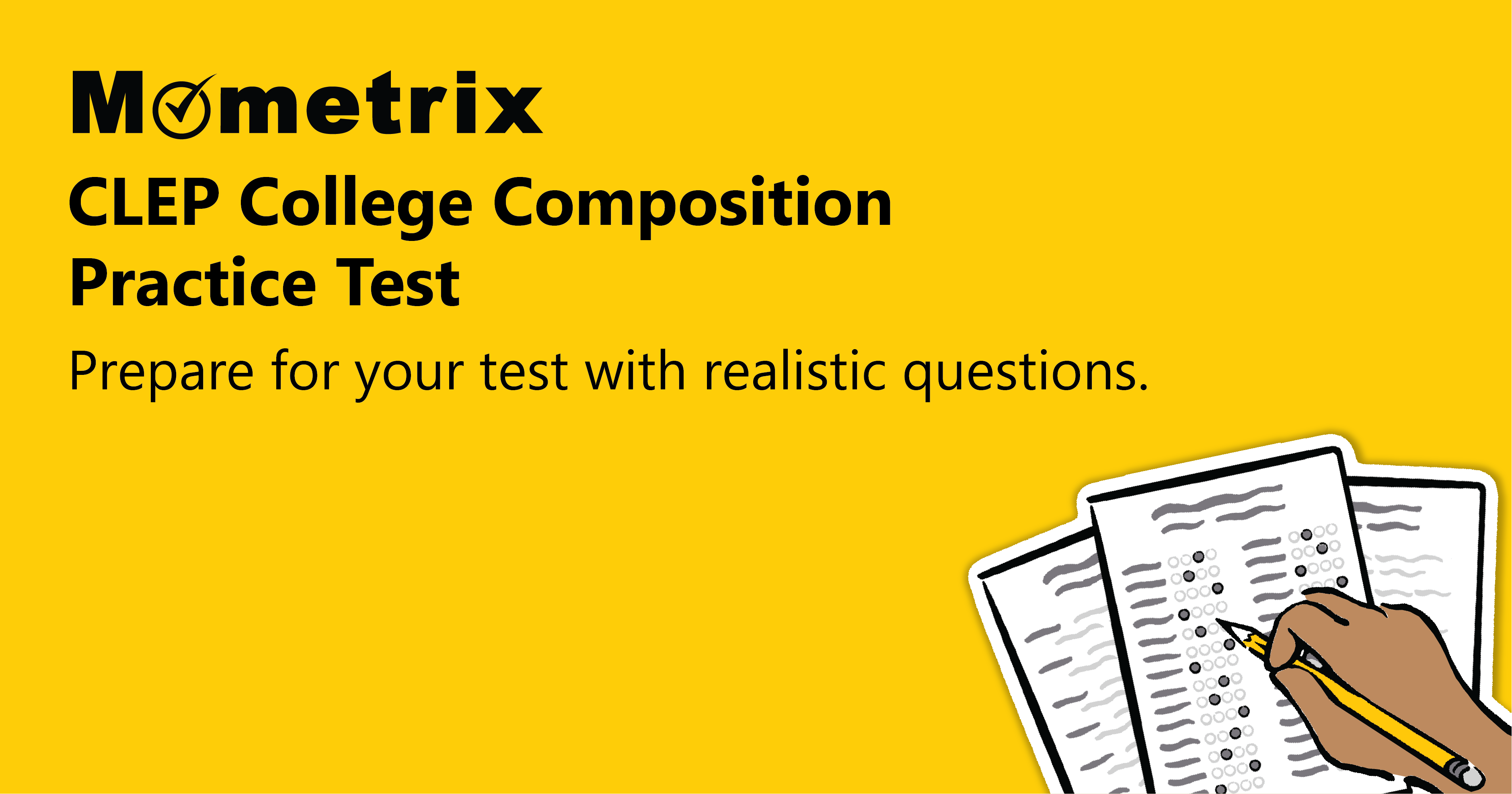The College Board administers the College-Level Examination Program® (CLEP®), which offers affordable exams to help students across the country receive college credits. This article covers the CLEP College Composition exam, which tests your writing skills and general English knowledge.
Click “Start Test” above to take a free CLEP College Composition practice test!
What is the CLEP College Composition Exam?
As mentioned previously, if you are already familiar with a particular subject without having a college education, CLEP exams can be taken to earn college credits for those subjects. If you have learned the exam material through life experience, previous studies, or on-the-job training, you can take this one exam and receive college credit as if you took the one-semester course!
By taking and passing the CLEP College Composition exam, you can skip the composition class at college, which could potentially result in the following:
- Save you money because the test is cheaper than a semester at college
- Allow you to earn three or more college credits
- Add flexibility to your degree program
- Allow you to graduate on time or possibly to graduate ahead of schedule
It is important that you check with your college before taking this exam to make sure it is an exam they will accept.
Eligibility
There are no eligibility requirements to take this exam! CLEP exams are available for anyone to take at any time, regardless of age or formal education.
Generally, you will see the following groups of people taking the CLEP College Composition exam:
- Homeschool students
- High school students who are preparing to graduate
- College students
- Adults who are returning to school
- Professionals who want to use the exam results to help advance their careers
- Applicants to master’s degree programs that still have undergraduate prerequisites they need to fulfill
CLEP College Composition Exam Outline
The CLEP College Composition exam contains 50 multiple-choice questions and two essays. The multiple-choice questions have a time limit of 55 minutes, while the essays are timed at 70 minutes.
The multiple-choice questions are split into four categories:
Conventions of Standard Written English (10%)
The knowledge and skills tested in this section include:
- Syntax
- Diction
- Logical comparison
- Punctuation
- Identification of correctly written sentences
- Idioms
- Logical agreement
- Sentence boundaries
- Passive and active voice
Revision Skills (40%)
The knowledge and skills tested in this section include:
- Sentence structure
- Transitions
- Evaluation of evidence
- Use of language
- Organization
- Consistency of point of view
- Main idea and thesis statements
- Topic sentences
- Coherence
- Level of detail
- Author’s appeal
- Rhetorical effects
- Awareness of audience
Ability to Use Source Materials (25%)
The knowledge and skills tested in this section include:
- Reference materials
- Source evaluation
- Integration of resource material
- Source documentation
Rhetoric Analysis (25%)
The knowledge and skills tested in this section include:
- Tone
- Use of language
- Appeals
- Evaluation of evidence
- Rhetorical effects
- Organization
- Structure
Essays
In this section, you will be asked to write two essays.
For the first essay, you will be given a statement and asked to write about the extent to which you agree or disagree. This essay will be based on your personal experiences and observations.
Essay 2
For the second essay, you will be given two sources that relate to the same topic and be asked to synthesize them. You will need to cite both sources any time you use a direct quote or paraphrase.
Check Out Mometrix's CLEP Study Guide
Get practice questions, video tutorials, and detailed study lessons
Get Your Study Guide
Registration
The CLEP College Composition exam is administered year-round on a very flexible schedule, and you can register via the College Board website.
First, you must create a College Board account. This will allow you to register, and you will be able to see any exams you have taken and view the grades of the exams you have taken. You can also request a transcript from this page.
During the registration process, you will need to pay the $97 exam fee and choose whether to take the exam at a testing center or from home via an online proctor.
Testing In-person
Once you have selected the testing center, date, and time that works best for you, you will need to print your exam ticket. You will not be admitted into the testing center without this printed ticket (a screenshot of the ticket will not be accepted).
Testing Remotely
Before you register, you should ensure that you meet the system requirements:
- You must have a PC desktop or laptop (Macs, Chromebooks, and tablets are not supported).
- Your computer must be using the Windows 10 operating system (Windows 11 is not supported).
- Your computer must have the most recent version of Google Chrome installed.
- You must have a speaker of some kind, internal or external (headphones are not allowed).
- You must have a camera and microphone, internal or external.
- You must have a reliable internet connection.
Once you have selected the date and time that works best for you, you will need to download the ETS Online Test desktop application. This app is what allows you to take the exam on your computer at home.
Test Day
In-person Testing
On the day of your exam, you should arrive at the testing center 15-30 minutes earlier than the scheduled time. Once you arrive, you will be asked to provide a valid, government-issued photo ID, as well as your printed registration ticket.
Before you enter the testing room, you will be asked to leave all personal items (cell phone, bag, coat, notes, food, etc.) in a secure locker outside the testing area. Since you are not allowed to bring your own calculator, a TI-30XS MultiView scientific calculator will be made available within the testing software:

Remote Testing
On the day of your exam, you will need to log in to your CLEP account 15-30 minutes prior to your scheduled exam time. Once you have logged in, you will need to download and install the Proctortrack desktop application. Within this app, you will be asked to verify your identity with a face scan, and you will need to scan your photo ID. You will also be asked to scan your testing room using your webcam.
Once the check-in process is complete, you will need to open the ETS Online Test desktop app, and the proctor will get you set up and start the exam.
During the exam, you must ensure that no one enters your testing area. If someone comes into your room, you must immediately ask them to leave, and you cannot say anything else.
Scoring
CLEP exams are scored with one point for each correct answer, and you will not have points removed for any incorrect answers or skipped questions. The number of correct answers you have will be your raw score.
Your raw score is converted into a scaled score, which is typically in numeric form ranging from 20 to about 80.
An unofficial score report will appear on the screen as soon as you finish the exam, and an official report will be made available the day after the exam when you log in to your CLEP account.
Passing Score
Each college has its own CLEP score requirements, so there is no universal passing score. You can usually find this score requirement on your college’s website or course catalog.
According to the American Council on Education, a scaled score of 50 or higher is often what colleges require.
Check Out Mometrix's CLEP Flashcards
Get complex subjects broken down into easily understandable concepts
Get Your Flashcards
Study Tips
How to Study Effectively
Your success on CLEP test day depends not only on how many hours you put into preparing but also on whether you prepared the right way. It’s good to check along the way to see whether your studying is paying off. One of the most effective ways to do this is by taking CLEP College Composition practice tests to evaluate your progress. Practice tests are useful because they show exactly where you need to improve. Every time you take a free CLEP College Composition exam practice test, pay special attention to these three groups of questions:
- The questions you got wrong
- The ones you had to guess on, even if you guessed right
- The ones you found difficult or slow to work through
This will show you exactly what your weak areas are and where you need to devote more study time. Ask yourself why each of these questions gave you trouble. Was it because you didn’t understand the material? Was it because you didn’t remember the vocabulary? Do you need more repetitions on this type of question to build speed and confidence? Dig into those questions and figure out how you can strengthen your weak areas as you go back to review the material.
Answer Explanations
Additionally, many CLEP College Composition practice tests have a section explaining the answer choices. It can be tempting to read the explanation and think that you now have a good understanding of the concept. However, an explanation likely only covers part of the question’s broader context. Even if the explanation makes sense, go back and investigate every concept related to the question until you’re positive you have a thorough understanding.
Comprehend Each Topic
As you go along, keep in mind that the CLEP practice test is just that: practice. Memorizing these questions and answers will not be very helpful on the actual test because it is unlikely to have any of the same exact questions. If you only know the right answers to the sample questions, you won’t be prepared for the real thing. Study the concepts until you understand them fully, and then you’ll be able to answer any question that shows up on the test.
Strategy for CLEP College Composition Practice
When you’re ready to start taking practice tests, follow this strategy:
- Remove Limitations. Take the first test with no time constraints and with your notes and CLEP study guide handy. Take your time and focus on applying the strategies you’ve learned.
- Time Yourself. Take the second practice test “open book” as well, but set a timer and practice pacing yourself to finish in time.
- Simulate Test Day. Take any other practice tests as if it were test day. Set a timer and put away your study materials. Sit at a table or desk in a quiet room, imagine yourself at the testing center, and answer questions as quickly and accurately as possible.
- Keep Practicing. Keep taking practice tests on a regular basis until you run out of practice tests or it’s time for the actual test. Your mind will be ready for the schedule and stress of test day, and you’ll be able to focus on recalling the material you’ve learned.
FAQs
Q
How many questions are on the CLEP College Composition exam?
A
There are 50 multiple-choice questions and two essays on the exam.
Q
How long is the CLEP College Composition exam?
A
The total time limit for the exam is about 2 hours; the multiple-choice questions are timed at 55 minutes, and the essays are timed at 70 minutes.
Q
What is the passing score for the CLEP College Composition exam?
A
There is no set passing score for the exam, but a scaled score of 50 is recommended.
Q
How much does the CLEP College Composition exam cost?
A
The exam fee is $97.
CLEP® and College-Level Examination Program® are trademarks registered by the College Board, which is not affiliated with, and does not endorse, this page.




